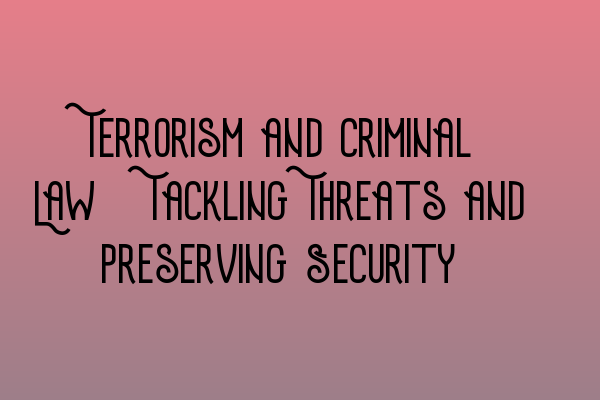Terrorism and Criminal Law: Tackling Threats and Preserving Security
In recent years, the world has witnessed an increase in acts of terrorism, posing significant threats to global security. As a result, governments and legal systems worldwide have taken stringent measures to combat these threats and ensure the safety of their citizens. In the United Kingdom, criminal law plays a crucial role in tackling terrorism and preserving security. In this blog post, we will delve into the intersection of terrorism and criminal law, examining the legal framework in place and the challenges faced in the fight against terrorism.
The Legal Framework
Under the Terrorism Act 2000, the UK has a comprehensive legal framework to deal with terrorism-related offenses. This legislation defines acts of terrorism, outlines the offenses, and provides powers to law enforcement agencies. The Act encompasses a wide range of activities, including planning, preparation, and funding of terrorist acts. It also includes provisions for the prosecution of individuals involved in the dissemination of terrorist material or the recruitment and training of terrorists. The Act empowers law enforcement agencies to investigate, arrest, and detain suspected terrorists.
The Counter-Terrorism and Border Security Act 2019 further strengthens the UK’s legal framework by criminalizing actions that undermine national security, such as expressing support for banned organizations or viewing terrorist propaganda online. Amendments to the Act also enable the authorities to monitor and restrict the activities of individuals who have returned from conflict zones or have links to terrorist organizations.
Challenges and Solutions
While the legal framework in the UK is robust, tackling terrorism remains a complex and ongoing challenge. One of the primary challenges is identifying and preventing radicalization. Individuals can become radicalized through various means, including online propaganda and extremist ideologies. Efforts to counter radicalization involve collaboration between law enforcement agencies, educational institutions, and community organizations. Programs and initiatives focused on early intervention and de-radicalization play a significant role in identifying at-risk individuals and diverting them from the path of extremism.
Another challenge is gathering and analyzing intelligence to identify potential terrorist threats. Law enforcement agencies rely on intelligence sharing and coordination at national and international levels to disrupt terrorist networks and prevent attacks. The use of advanced technologies, such as data analytics and artificial intelligence, has significantly contributed to improving intelligence capabilities and identifying patterns of suspicious activities.
The Role of Criminal Law Practitioners
Criminal law practitioners play a vital role in the fight against terrorism. They are responsible for ensuring that those charged with terrorism-related offenses receive a fair trial and that their rights are protected. Criminal lawyers specializing in terrorism cases navigate the complexities of the legal framework, providing legal representation to both the prosecution and the defense. They work closely with law enforcement agencies, intelligence services, and prosecutors to ensure the evidentiary requirements are met and that justice is served.
As an experienced criminal law firm, SQE Criminal Law & Practice Law UK understands the challenges and complexities of terrorism cases. Our team of dedicated solicitors has a deep understanding of the legal framework surrounding terrorism offenses and is committed to upholding the principles of justice and fairness.
If you require legal assistance or representation in a terrorism-related matter, contact SQE Criminal Law & Practice Law UK today. Our experienced solicitors will guide you through the legal process, ensuring your rights are protected and providing the best possible defense.
Conclusion
Terrorism poses a significant threat to global security, and criminal law plays a vital role in addressing this threat. The UK’s legal framework provides a strong basis for combating terrorism, but ongoing efforts are necessary to tackle the ever-evolving nature of this threat. By prioritizing intelligence sharing, prevention, and intervention programs, and ensuring fair and just trials, we can work towards preserving security and protecting society from acts of terrorism.
Related Articles:
- Unveiling Duress and Undue Influence in Contracts
- Essentials of Consideration: Understanding the Backbone of Contracts
- Express and Implied Terms in Contracts: Decoding Agreement Components
- Counter-offers: Navigating Negotiations in Contract Law
- Mistake in Contract Law: Unraveling the Impact on Agreement Validity
